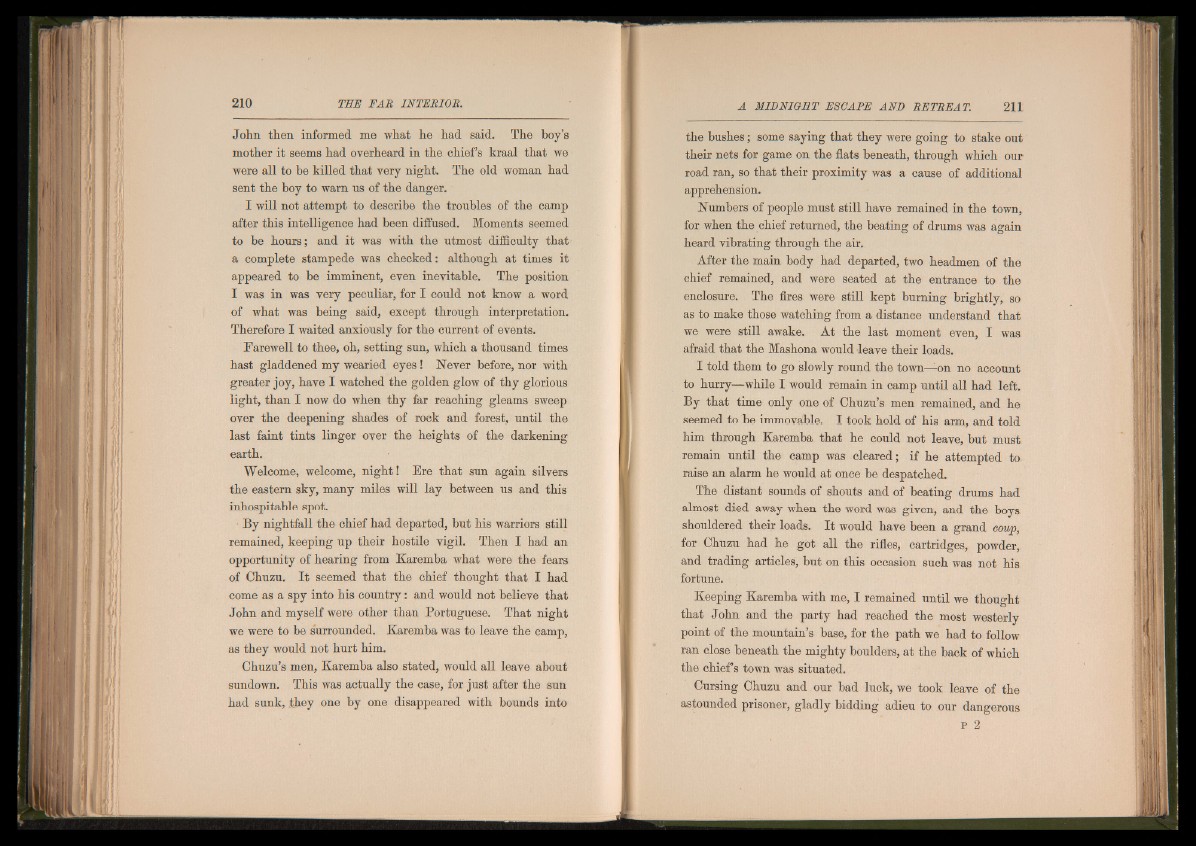
John then informed me what he had said. The boy’s
mother it seems had overheard in the chief’s kraal that we
were all to be killed that very night. The old woman had
sent the boy to warn us of the danger.
I will not attempt to describe the troubles of the camp
after this intelligence had been diffused. Moments seemed
to be hours; and it was with the utmost difficulty that
a complete stampede was checked: although at times it
appeared to be imminent, even inevitable. The position
I was in was very peculiar, for I could not know a word
of what was being said, except through interpretation.
Therefore I waited anxiously for the current of events.
Farewell to thee, oh, setting sun, which a thousand times
hast gladdened my wearied eyes ! Never before, nor with
greater joy, have I watched the golden glow of thy glorious
light, than I now do when thy far reaching gleams sweep
over the deepening shades of rock and forest, until the
last faint tints linger over the heights of the darkening
earth.
Welcome, welcome, night! Ere that sun again silvers
the eastern sky, many miles will lay between us and this
inhospitable spot.
By nightfall the chief had departed, but his warriors still
remained, keeping up their hostile vigil. Then I had an
opportunity of hearing from Karemba what were the fears
of Chuzu. I t seemed that the chief thought that I had
come as a spy into his country: and would not believe that
John aiid myself were other than Portuguese. That night
we were to be surrounded. Karemba was to leave the camp,
as they would not hurt him.
Chuzu’s men, Karemba also stated, would all leave about
sundown. This was actually the case, for just after the sun
had sunk, they one by one disappeared with bounds into
the bushes; some saying that they were going to stake out
their nets for game on the flats beneath, through which our
road ran, so that their proximity was a cause of additional
apprehension.
Numbers of people must still have remained in the town,
for when the chief returned, the beating of drums was again
heard vibrating through the air.
After the main body had departed, two headmen of the
chief remained, and were seated at the entrance to the
enclosure. The fires were still kept burning brightly, so
as to make those watching from a distance understand that
we were still awake. At the last moment even, I was
afraid that the Mashona would leave their loads.
I told them to go slowly round the town—on no account
to hurry—while I would remain in camp until all had left.
By that time only one of Ohuzu’s men remained, and he
seemed to be immovable. I took hold of his arm, and told
him through Karemba that he could not leave, but must
remain until the camp was cleared; if he attempted to
raise an alarm he would at once be despatched.
The distant sounds of shouts and of beating drums had
almost died away when the word was given, and the boys
shouldered their loads. I t would have been a grand coup,
for Chuzu had he got all the rifles, cartridges, powder,
and trading articles, but on this occasion such was not his
fortune.
Keeping Karemba with me, I remained until we thought
that John and the party had reached the most westerly
point of the mountain’s base, for the path we had to follow
ran close beneath the mighty boulders, at the back of which
the chief’s town was situated.
Cursing Chuzu and our bad luck, we took leave of the
astounded prisoner, gladly bidding adieu to our dangerous
p 2